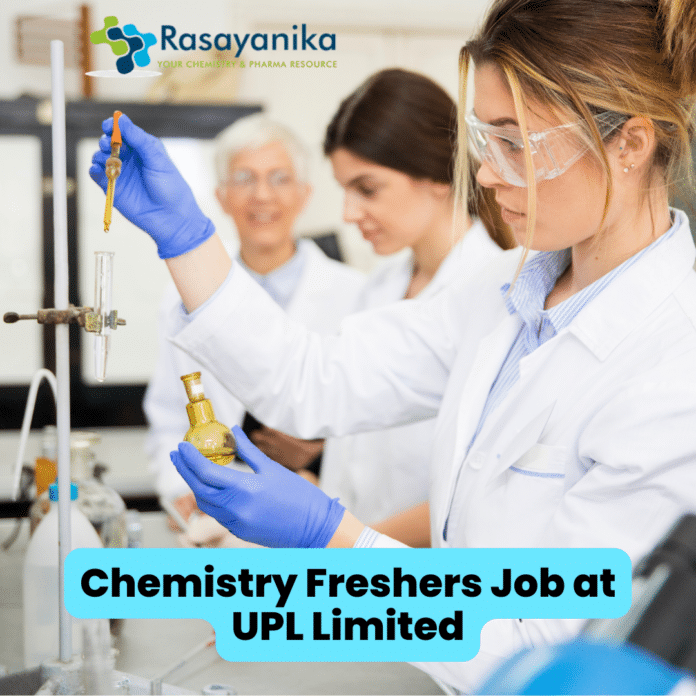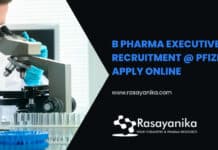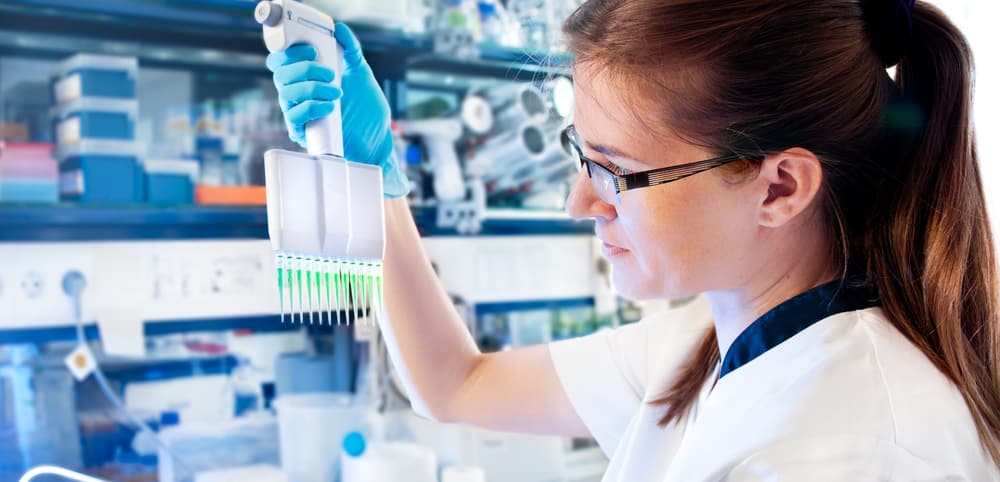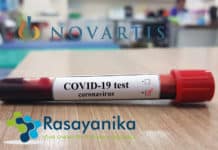MSc Chemistry Freshers Job at UPL Limited
UPL Limited Hiring MSc Chemistry Freshers for Research Associate Analytical Job. Interested Candidates can check out the details below and Apply Online.
Job Post: Sr. Research Associate Analytical
Job Id: 7808
Job Location: 01021, Maharashtra, India
Job Category: R and D Chemistry
Employee Type: Permanent Full Time
The candidate must have good knowledge on
- Analytical instruments like HPLC, UPLC, GC, DSC, IR, KF titrator
- Calibration of analytical instruments
- Different guidelines like CIPAC / BIS / ABNT / FAO etc
- Surfactant analysis
Responsibilities
- Conducting day to day analysis of developmental and aging study samples
- Method development and validation
- Making sure that data is accurately analyzed and recorded
- Regular review and timely reporting of results to the superiors
- Documentation of experimental results in standard formats
- Preparation of COA’s
- Trouble shooting of analytical instruments
Qualification:
- MSc in Chemistry (Organic / Analytical / Agrochemical)
- 0-3 years of Experience of working in lab and handling various analytical equipment
- Good understanding of pesticide formulation chemistry.
- Knowledge of analytical equipment’s related to formulations.
Here are five interview questions along with sample answers for the position of Sr. Research Associate Analytical in the R&D Chemistry department:
1. Question: Can
you describe your experience with analytical instruments such as HPLC, UPLC, GC, DSC, IR, and KF titrator, and how have you utilized them in your previous roles?Answer: In my previous role at XYZ Pharmaceuticals, I had extensive hands-on experience with various analytical instruments, including HPLC, UPLC, GC, DSC, IR, and KF titrator. These instruments were essential for analyzing pharmaceutical compounds, ensuring their purity, and assessing their stability. For instance, I routinely used HPLC for quantitative analysis of drug formulations. This allowed me to determine the concentration of active ingredients accurately, ensuring product quality and compliance with regulatory standards.
2. Question: How do you approach the calibration of analytical instruments, and why is it crucial for accurate analytical results?
Answer: Calibrating analytical instruments is a critical step in ensuring the reliability of analytical results. I follow established calibration procedures, which involve using standard reference materials to verify and adjust instrument parameters. Regular calibration ensures that instruments remain accurate and precise over time. It’s essential because inaccurate instrument readings can lead to incorrect data, potentially affecting product quality and regulatory compliance. My experience includes performing routine instrument calibration, documenting results, and taking corrective actions when necessary to maintain data integrity.
3. Question: Can you explain your familiarity with different guidelines like CIPAC, BIS, ABNT, and FAO, and how have you applied them in your analytical work?
Answer: I have a solid understanding of various guidelines such as CIPAC, BIS, ABNT, and FAO, which are relevant to the field of analytical chemistry, especially in the context of pesticide formulation analysis. These guidelines provide standardized methods and quality standards for analytical testing. For instance, I’ve used CIPAC methods to ensure the accurate assessment of pesticide formulations. Following these guidelines is crucial for maintaining consistency, comparability, and compliance with industry and regulatory requirements.
4. Question: How have you conducted surfactant analysis in your previous roles, and what techniques or methods did you use for this purpose?
Answer: Surfactant analysis is essential in various industries, including agrochemicals. In my previous role, I conducted surfactant analysis using methods such as HPLC and titration. HPLC allowed for the separation and quantification of different surfactant components, ensuring product consistency and quality. Additionally, titration methods like Karl Fischer (KF) titration were employed for moisture content determination in surfactant formulations. These analyses helped guarantee the efficacy and stability of surfactant-based products.
5. Question: Can you provide an example of a challenging situation you faced while troubleshooting analytical instruments, and how did you resolve it to ensure minimal disruption to the analytical process?
Answer: In one instance, our HPLC system encountered a recurring pressure fluctuation issue during a critical analysis. To troubleshoot, I followed a systematic approach. I checked the pump, seals, and tubing for any leaks or blockages and found a minor blockage in the column filter. I replaced the filter, performed system equilibration, and verified the pressure stability. This quick intervention ensured minimal disruption to the analysis, and we were able to complete the test successfully. This experience underscores the importance of regular instrument maintenance and troubleshooting skills to maintain the efficiency of the analytical process.
These sample questions and answers should help you prepare for your interview for the Sr. Research Associate Analytical position in the R&D Chemistry department. Customize your responses based on your specific experiences and qualifications.
Subscribe Rasayanika for more Chemistry and Pharma job updates.

















































